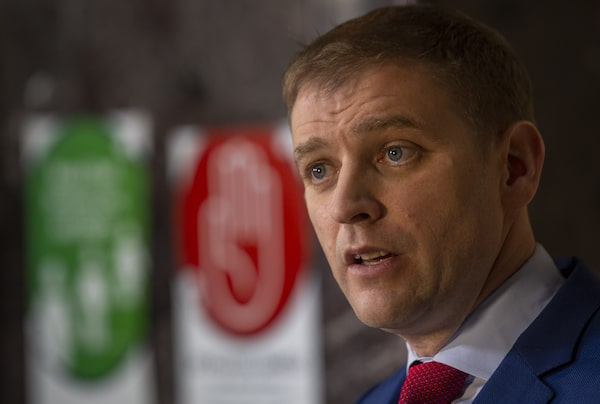
Newfoundland and Labrador Premier Andrew Furey at a press conference in the lobby of the Confederation Building in St. John’s on Jan. 15, 2021.Paul Daly/The Canadian Press
Newfoundland and Labrador voters head to the polls Saturday with their province looking over the edge of a financial precipice. And yet no one vying to form the next government wants to face the one problem that is within their power to address.
The province has a serious spending addiction.
In a paper published last week by the C.D. Howe Institute, veteran economist Don Drummond and long-time senior civil servant Louis Lévesque argue that exorbitant spending is “by far the largest factor” in Newfoundland’s fiscal woes. The province’s program expenses, on a per-capita basis, are the highest in the country – a massive 32 per cent above the national average over the past decade.
To Mr. Drummond and Mr. Lévesque, if spending is the root of the problem, it must be the route to the solution.
“To put its finances back on a sustainable track, Newfoundland and Labrador will have to bring its program spending down much closer to levels in other provinces,” they concluded.
What’s more, they said, one of the biggest components in that spending – substantially higher-than-average compensation costs for public employees – means that reining in public-sector employment and wage levels will be an essential part of those cuts.
There’s certainly no disputing, even among the parties competing in this election campaign, that Newfoundland and Labrador has to do something to reverse a government finance situation that is unsustainable, and hurtling toward all-out crisis. The province with a population of just 520,000 is carrying roughly $16-billion in net government debt, giving it the highest debt per capita and debt-to-GDP ratio in the country. Even in the current low-interest-rate environment, the government is spending 15 cents out of every dollar it brings in just to pay the interest on its debt.
Meanwhile, Newfoundland and Labrador’s prospects for growing its revenues sufficiently to cover its expenses and rein in its debt, at least over the foreseeable horizon, are bleak.
The province’s golden goose of the past – its offshore oil industry – has been in a six-year slump that only deepened with the pandemic. Given the growing global momentum toward greener energy sources, the government may never see a recovery in the massive oil royalties that once filled its coffers and sustained its ambitious spending programs.
Newfoundland and Labrador’s demographics are also working against it. Its population is shrinking – down 1.7 per cent over the past four years. Over the same period, its median age increased by nearly two years, to 47.4 years; 22 per cent of the province is over 65. That’s a recipe for both economic stagnation and rising public costs, as the labour force and tax base shrink, while demand for seniors’ services and health care rises.
The situation is exacerbated by the wildly over-budget Muskrat Falls hydroelectric project. The province is not only on the hook for billions of dollars in additional debt, but it may also face a massive increase in electricity rates later this year, when the project starts generating power and the costs are reflected on ratepayers’ bills. The Muskrat Falls debacle has only deepened the province’s debt risk, and further burdened its economy and, by extension, its capacity for revenue growth.
If cost cuts are the unavoidable consequence of all this – as they appear to be – they have nevertheless proven surprisingly avoidable in the election campaign. No party is willing to address the elephant in the room, which is bound to be unpopular and would put government on a collision course with public-sector unions.
The opposition Progressive Conservatives are talking tough about delivering balanced budgets and reining in the debt, but the strategy laid out in their platform hinges on getting Ottawa to rewrite its rules for equalization and federal transfers, and to agree to buy a stake in Muskrat Falls. Party Leader Ches Crosbie has spoken against cuts to the public service and programs, while depicting the incumbent Liberals as having a hidden agenda to make such cuts.
In last week’s leaders’ debate, Premier Andrew Furey – whose Liberals are expected to win Saturday’s vote – insisted that he’s not planning “mass layoffs” of public employees, saying, “Now is not the time to take jobs out of the economy.”
But that time may still come for Mr. Furey. His campaign has deferred judgment on a financial plan until the Economic Recovery Team he established last fall can deliver its recommendations – which won’t come until well after the election. The team is headed by Moya Greene, former head of both Canada Post and Britain’s Royal Mail service, who has a reputation in the public service for cost-cutting and privatizations. Some observers believe that her choice for the job signals that the Liberals do favour program cuts and selling off government assets, and stacked the advisory panel accordingly.
Such a conclusion would be an unpopular one among many voters; who can blame Mr. Furey for delaying such harsh medicine until after the election. But if Newfoundlanders and Labradorians are honest about what’s good for them, it’s medicine they will surely have to take.
Your time is valuable. Have the Top Business Headlines newsletter conveniently delivered to your inbox in the morning or evening. Sign up today.
 David Parkinson
David Parkinson